初中英语复习专题课件 一般将来时
图片预览

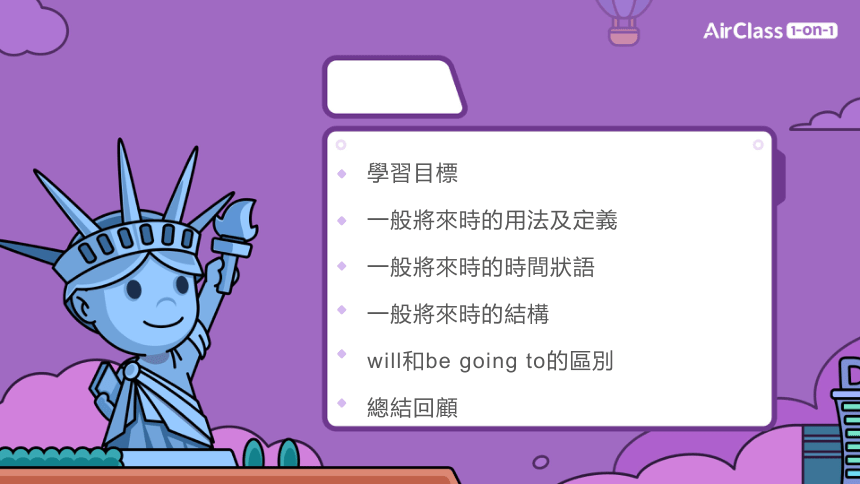

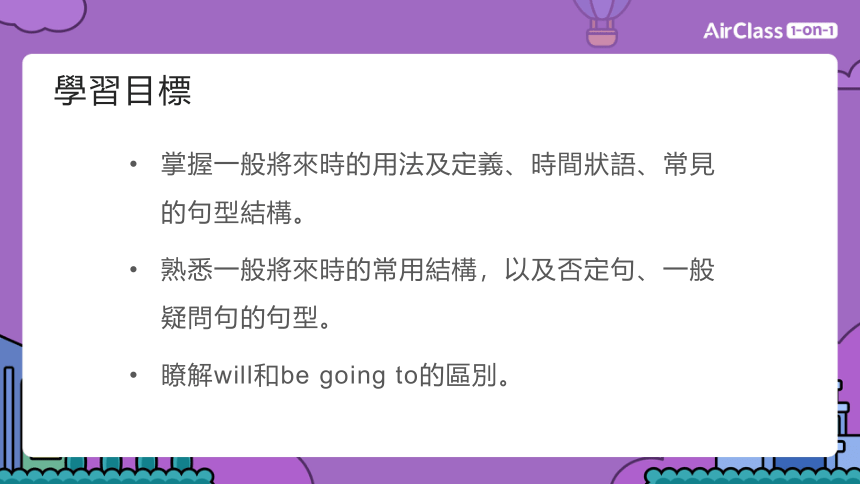
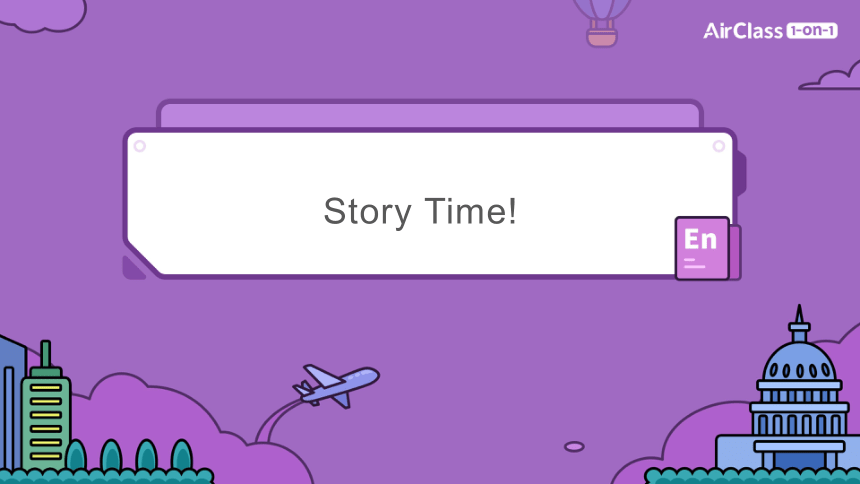
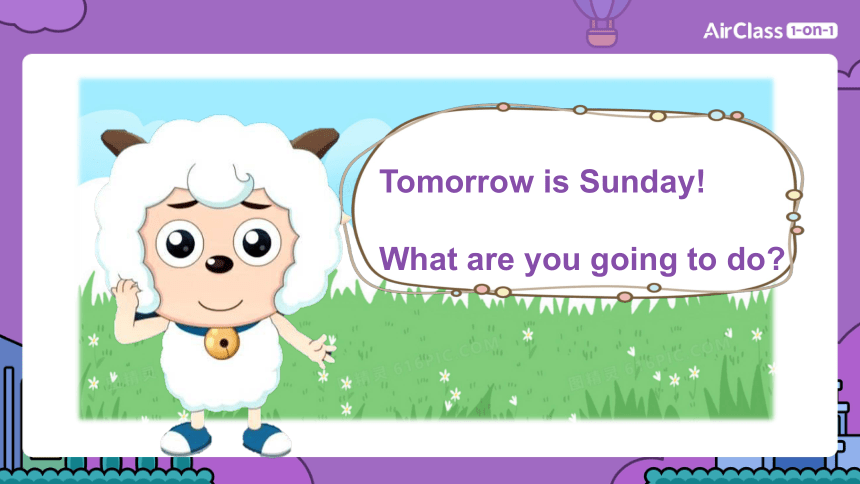
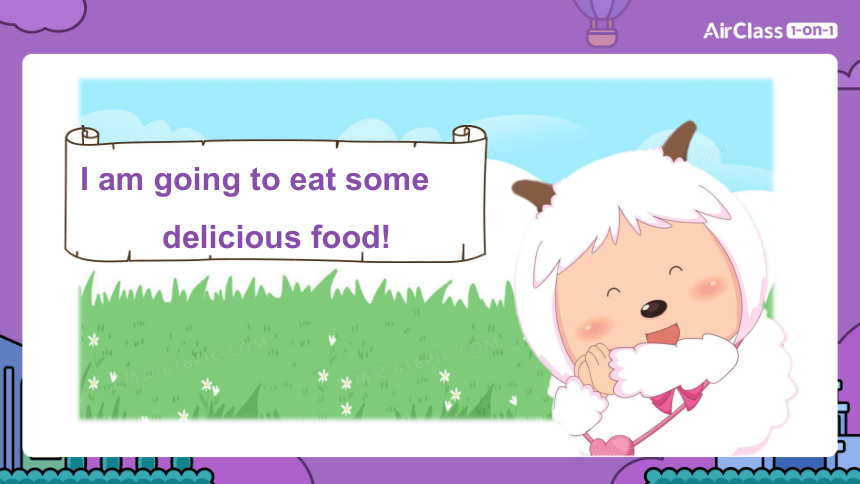
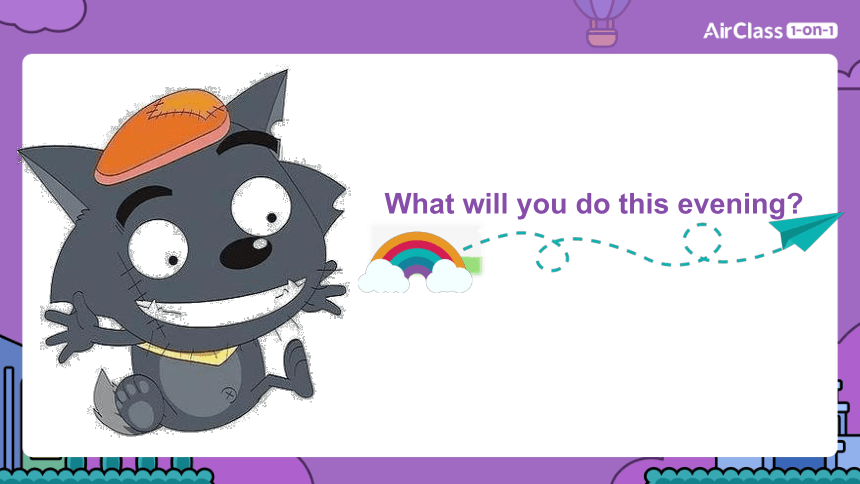


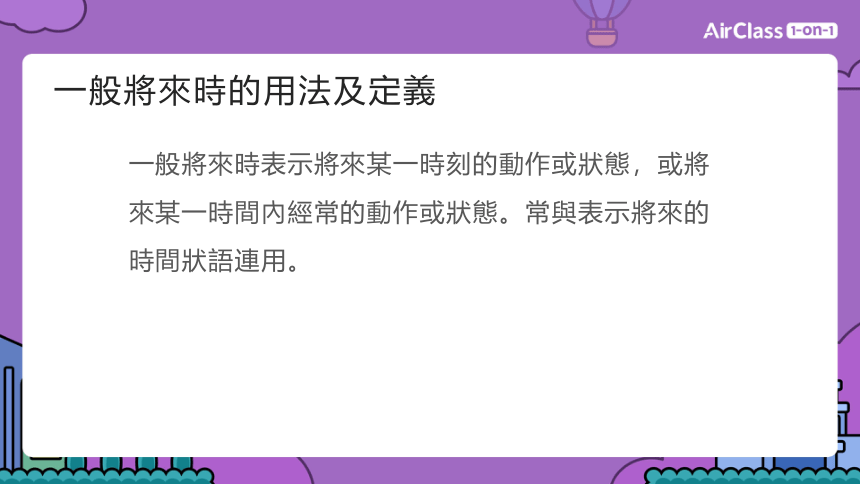

文档简介
(共40张PPT)
一般將來時的用法及定義
一般將來時的時間狀語
一般將來時的結構
will和be
going
to的區別
總結回顧
學習目標
學習目標
掌握一般將來時的用法及定義、時間狀語、常見的句型結構。
熟悉一般將來時的常用結構,以及否定句、一般疑問句的句型。
瞭解will和be
going
to的區別。
學習目標
Story
Time!
Tomorrow
is
Sunday!
What
are
you
going
to
do?
I
am
going
to
eat
some
delicious
food!
What
will
you
do
this
evening?
I
will
do
my
homework!
一般將來時的用法及定義
一般將來時表示將來某一時刻的動作或狀態,或將來某一時間內經常的動作或狀態。常與表示將來的時間狀語連用。
一般將來時的用法及定義
一般將來時的時間狀語
tomorrow
系列
next+時間
系列
this+時間
系列
in+一段時間
系列
tonight、soon、from
now
on、When+時間狀語從句
時間狀語:
tomorrow
明天
tomorrow
morning
明天早上
tomorrow
evening
明天晚上
e.g.
She’s
going
to
dance
here
tomorrow
evening.
她明天晚上將要在這裡跳舞。
時間狀語——tomorrow系列
next
下一個
next
Sunday
下一個星期天
next
year
下一年
e.g.
It
will
be
rainy
next
week.
下周將是多雨的。
時間狀語——next+時間系列
this
afternoon
今天下午
this
Saturday
今天週六
this
weekend
這週末
e.g.
My
family
will
have
a
picnic
this
Saturday.
我的家人本週六將會野餐。
時間狀語——this+時間系列
in
three
days三年後
in
a
year
一年後
in
the
future
在未來
e.g.
I
will
return
your
books
in
three
days.
我三天后將要歸還你的書。
時間狀語——in+一段時間系列
tonight
今晚
soon
不久後、馬上
from
now
on
從現在起
When+時間狀語從句
當……的時候
e.g.
He
will
be
a
doctor
when
he
grows
up.
他長大之後將會成為一名醫生。
時間狀語——單詞/短語/從句系列
一般將來時的結構
陳述句:主語+will+動詞原形+其他.
e.g.
I
will
see
a
film
tomorrow.
我明天將要去看電影。
一般將來時的結構——will句型
否定句:主語+will+not+動詞原形+其他.
e.g.
We
will
not
go
out
because
of
the
rain.
我們將不能出去,因為我們有太多作業。
疑問句:Will+主語+動詞原形+其他?
e.g.
Will
you
go
to
school
by
car?
你將開車去學校嗎?
一般將來時的句型轉換
陳述句:主語+be
going
to+動詞原形+其他.
e.g.
I
am
going
to
read
English
in
the
evening.
在晚上我將要讀英語。
一般將來時的結構——be
going
to句型
否定句:主語+be
not
going
to+動詞原形+其他.
e.g.
We
are
not
going
to
go
swimming.
我們不去游泳。
疑問句:Be+主語+going
to+動詞原形+其他?
e.g.
Are
you
going
to
have
a
picnic
tomorrow?
明天你們會去野餐嗎?
一般將來時的句型轉換
will和be
going
to的區別
will和be
going
to都表示將要做某事。
一般情況下,will和be
going
to可以相互轉換。
e.g.
I
will
study
hard
next
term.
am
going
to
They
are
going
to
write
carefully
next
year?
will
will和be
going
to的區別
be
going
to表示較近一段時間將要發生的事情,will表示的時間較遠一些。
e.g.
He
is
going
to
write
a
letter
tonight.
He
will
write
a
book
one
day.
區別一:
be
going
to表示主觀判斷將來肯定發生的事情,will表示客觀勢必發生的事情。
e.g.
He
is
going
to
die.
He
will
be
twenty
years
old.
區別二:
be
going
to有“計畫、準備”的意思,will沒有這個意思。
e.g.
She
is
going
to
lend
us
her
book.
He
will
be
here
in
half
an
hour.
區別三:
總結回顧
總結回顧
經典例題
1.
It
is
going
to
_______
tomorrow.
rainy
be
rain
be
rainy
【答案】C
【解析】本題考察一般將來時陳述句的結構。主語是it,時間狀語是tomorrow,所以謂語動詞應該選擇will+動詞原形或者be
going
to+動詞原形,所以A選項不符合。由於be動詞後應加名詞或形容詞,rain是動詞,故選擇C。
2、——_______
you
go
swimming
tomorrow?
——Yes.
Will
Did
Are
【答案】A
【解析】本題考察一般將來時的句型。由於句中謂語動詞go是動詞的原形,綜合分析答案選擇A。
3、——Are
you
going
to
see
a
play
this
Friday?
——No.
I
_____.
don't
am
not
won't
【答案】B
【解析】本題考察一般將來時的回答。問句用be
you
going
to
……提問,答句用be動詞來回答,故選B。
4、——What
are
you
going
to
______?
——We
are
going
to
______.
do;
swimming
be;
swim
do;
skate
【答案】C
【解析】本題考察一般將來時中be
going
to
be和be
going
to
do的區別,be
going
to
be翻譯成“將要成為”,
be
going
to
do翻譯成“將要做”,根據題意,B選項被排除。be
going
to
後應該加動詞原形,故本題選擇C選項。
一般將來時的用法及定義
一般將來時的時間狀語
一般將來時的結構
will和be
going
to的區別
總結回顧
學習目標
學習目標
掌握一般將來時的用法及定義、時間狀語、常見的句型結構。
熟悉一般將來時的常用結構,以及否定句、一般疑問句的句型。
瞭解will和be
going
to的區別。
學習目標
Story
Time!
Tomorrow
is
Sunday!
What
are
you
going
to
do?
I
am
going
to
eat
some
delicious
food!
What
will
you
do
this
evening?
I
will
do
my
homework!
一般將來時的用法及定義
一般將來時表示將來某一時刻的動作或狀態,或將來某一時間內經常的動作或狀態。常與表示將來的時間狀語連用。
一般將來時的用法及定義
一般將來時的時間狀語
tomorrow
系列
next+時間
系列
this+時間
系列
in+一段時間
系列
tonight、soon、from
now
on、When+時間狀語從句
時間狀語:
tomorrow
明天
tomorrow
morning
明天早上
tomorrow
evening
明天晚上
e.g.
She’s
going
to
dance
here
tomorrow
evening.
她明天晚上將要在這裡跳舞。
時間狀語——tomorrow系列
next
下一個
next
Sunday
下一個星期天
next
year
下一年
e.g.
It
will
be
rainy
next
week.
下周將是多雨的。
時間狀語——next+時間系列
this
afternoon
今天下午
this
Saturday
今天週六
this
weekend
這週末
e.g.
My
family
will
have
a
picnic
this
Saturday.
我的家人本週六將會野餐。
時間狀語——this+時間系列
in
three
days三年後
in
a
year
一年後
in
the
future
在未來
e.g.
I
will
return
your
books
in
three
days.
我三天后將要歸還你的書。
時間狀語——in+一段時間系列
tonight
今晚
soon
不久後、馬上
from
now
on
從現在起
When+時間狀語從句
當……的時候
e.g.
He
will
be
a
doctor
when
he
grows
up.
他長大之後將會成為一名醫生。
時間狀語——單詞/短語/從句系列
一般將來時的結構
陳述句:主語+will+動詞原形+其他.
e.g.
I
will
see
a
film
tomorrow.
我明天將要去看電影。
一般將來時的結構——will句型
否定句:主語+will+not+動詞原形+其他.
e.g.
We
will
not
go
out
because
of
the
rain.
我們將不能出去,因為我們有太多作業。
疑問句:Will+主語+動詞原形+其他?
e.g.
Will
you
go
to
school
by
car?
你將開車去學校嗎?
一般將來時的句型轉換
陳述句:主語+be
going
to+動詞原形+其他.
e.g.
I
am
going
to
read
English
in
the
evening.
在晚上我將要讀英語。
一般將來時的結構——be
going
to句型
否定句:主語+be
not
going
to+動詞原形+其他.
e.g.
We
are
not
going
to
go
swimming.
我們不去游泳。
疑問句:Be+主語+going
to+動詞原形+其他?
e.g.
Are
you
going
to
have
a
picnic
tomorrow?
明天你們會去野餐嗎?
一般將來時的句型轉換
will和be
going
to的區別
will和be
going
to都表示將要做某事。
一般情況下,will和be
going
to可以相互轉換。
e.g.
I
will
study
hard
next
term.
am
going
to
They
are
going
to
write
carefully
next
year?
will
will和be
going
to的區別
be
going
to表示較近一段時間將要發生的事情,will表示的時間較遠一些。
e.g.
He
is
going
to
write
a
letter
tonight.
He
will
write
a
book
one
day.
區別一:
be
going
to表示主觀判斷將來肯定發生的事情,will表示客觀勢必發生的事情。
e.g.
He
is
going
to
die.
He
will
be
twenty
years
old.
區別二:
be
going
to有“計畫、準備”的意思,will沒有這個意思。
e.g.
She
is
going
to
lend
us
her
book.
He
will
be
here
in
half
an
hour.
區別三:
總結回顧
總結回顧
經典例題
1.
It
is
going
to
_______
tomorrow.
rainy
be
rain
be
rainy
【答案】C
【解析】本題考察一般將來時陳述句的結構。主語是it,時間狀語是tomorrow,所以謂語動詞應該選擇will+動詞原形或者be
going
to+動詞原形,所以A選項不符合。由於be動詞後應加名詞或形容詞,rain是動詞,故選擇C。
2、——_______
you
go
swimming
tomorrow?
——Yes.
Will
Did
Are
【答案】A
【解析】本題考察一般將來時的句型。由於句中謂語動詞go是動詞的原形,綜合分析答案選擇A。
3、——Are
you
going
to
see
a
play
this
Friday?
——No.
I
_____.
don't
am
not
won't
【答案】B
【解析】本題考察一般將來時的回答。問句用be
you
going
to
……提問,答句用be動詞來回答,故選B。
4、——What
are
you
going
to
______?
——We
are
going
to
______.
do;
swimming
be;
swim
do;
skate
【答案】C
【解析】本題考察一般將來時中be
going
to
be和be
going
to
do的區別,be
going
to
be翻譯成“將要成為”,
be
going
to
do翻譯成“將要做”,根據題意,B選項被排除。be
going
to
後應該加動詞原形,故本題選擇C選項。
同课章节目录
- 词法
- 名词
- 动词和动词短语
- 动词语态
- 动词时态
- 助动词和情态动词
- 非谓语动词
- 冠词
- 代词
- 数词和量词
- 形容词副词及其比较等级
- 介词和介词短语
- 连词和感叹词
- 构词法
- 相似、相近词比较
- 句法
- 陈述句
- 一般疑问句和否定疑问句
- 特殊疑问句及选择疑问句
- 反意疑问句
- 存在句(There be句型)
- 宾语从句
- 定语从句
- 状语从句
- 主谓一致问题
- 简单句
- 并列句
- 复合句
- 主谓一致
- 主、表语从句
- 名词性从句
- 直接引语和间接引语
- 虚拟语气
- 感叹句
- 强调句
- 倒装句
- 祈使句
- 句子的成分
- 句子的分类
- 题型专区
- 单项选择部分
- 易错题
- 完形填空
- 阅读理解
- 词汇练习
- 听说训练
- 句型转换
- 补全对话
- 短文改错
- 翻译
- 书面表达
- 任务型阅读
- 语法填空
- 其他资料
